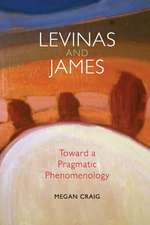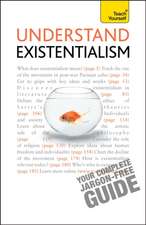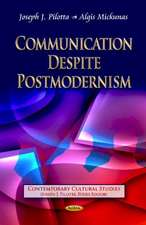Beckett's Words: The Promise of Happiness in a Time of Mourning
Autor David Kleinberg-Levinen Limba Engleză Paperback – 29 iul 2015
| Toate formatele și edițiile | Preț | Express |
|---|---|---|
| Paperback (1) | 183.10 lei 3-5 săpt. | |
| Bloomsbury Publishing – 29 iul 2015 | 183.10 lei 3-5 săpt. | |
| Hardback (1) | 775.83 lei 6-8 săpt. | |
| Bloomsbury Publishing – 29 iul 2015 | 775.83 lei 6-8 săpt. |
Preț: 183.10 lei
Preț vechi: 224.78 lei
-19% Nou
Puncte Express: 275
Preț estimativ în valută:
35.04€ • 36.68$ • 28.99£
35.04€ • 36.68$ • 28.99£
Carte disponibilă
Livrare economică 15-29 martie
Preluare comenzi: 021 569.72.76
Specificații
ISBN-13: 9781474216838
ISBN-10: 1474216838
Pagini: 328
Dimensiuni: 156 x 234 x 20 mm
Greutate: 0.57 kg
Editura: Bloomsbury Publishing
Colecția Bloomsbury Academic
Locul publicării:London, United Kingdom
ISBN-10: 1474216838
Pagini: 328
Dimensiuni: 156 x 234 x 20 mm
Greutate: 0.57 kg
Editura: Bloomsbury Publishing
Colecția Bloomsbury Academic
Locul publicării:London, United Kingdom
Caracteristici
David Kleinberg-Levin is a world-renowned expert in the relationship between philosophy and literature
Notă biografică
David Kleinberg-Levin is Professor Emeritus of Philosophy at Northwestern University, USA. His books include Gestures of Ethical Life: Reading Hölderlin's Question of Measure After Heidegger (2005); Redeeming Words and the Promise of Happiness: A Critical Theory Approach to Wallace Stevens and Vladimir Nabokov (2012); and Redeeming Words: Language and the Promise of Happiness in the Stories of Döblin and Sebald (2013).
Cuprins
Acknowledgements Abbreviations Prologue: Nothing . . . But Words: Words and Tears PART ONE No Theodicy: A Chance of Happiness? 1 Negative Dialectics 2 In the Secret of Guilt: Punishment as Meaning 3 Political Theology: Old Dictations, Old Knots 4 Ending the Endings: The Endgame of Theodicy PART TWO The Utopian Idea: Remembering the Future in the Past 1 Paradise: Nowhere-But Here! 2 Tales for Children: Retrieving the Enchantment 3 Hope and Despair in a Time of Mourning 4 Waiting: In the Meantime 5 In the Event of a New Word PART THREE After Hegel, Beckett's How It Is: Approaching Justice with Infinite Slowness 1 Swamp: Justice in the State of Nature 2 The Struggle for Acknowledgement and Recognition 3 Cruelty and Kindness: Humanity in Question 4 The Human Voice: Of Promises and Solaces 5 Redeeming Words 6 Where in the World is Justice? Notes Bibliography PermissionsIndex
Recenzii
By multiplying astute and original links between Beckett's texts and a philosophical tradition moving from Kierkegaard to Adorno, from Kant to Derrida, and from Hegel to Agamben, Beckett's Words demonstrates not so much that "nothing is funnier than unhappiness," as Nell quips in Endgame, but rather that happiness remains a serious task for literature. If Beckett's pointless waiting offers the paradigm of a paradoxical hope without hope, then Beckett's words will never be "dying words." Words of endless survival, they keep the promise for a beauty and a justice still to come.
To link Samuel Beckett and happiness in the same sentence without an intervening "not" is tantamount to heresy, the call of an apostate; yet the received wisdom of Beckett Studies is ripe for challenge, and Kleinberg-Levin obliges. From its opening pages, Beckett's Words is marked by a freshness and erudition from a scholar who actively "does" philosophy. It is a welcome addition to the ongoing rethinking of Samuel Beckett's work, especially of his philosophical inclinations and complexities. I would put Kleinberg-Levin's work up against any of the critiques of Beckett and philosophy.
Sets out to enrich our understanding of Beckett's philosophical relation to language from the perspectives of Walter Benjamin and Theodor Adorno ... One of the work's signal achievements is Levin's attention to philosophical energies less frequently discusses in Beckett studies.
To link Samuel Beckett and happiness in the same sentence without an intervening "not" is tantamount to heresy, the call of an apostate; yet the received wisdom of Beckett Studies is ripe for challenge, and Kleinberg-Levin obliges. From its opening pages, Beckett's Words is marked by a freshness and erudition from a scholar who actively "does" philosophy. It is a welcome addition to the ongoing rethinking of Samuel Beckett's work, especially of his philosophical inclinations and complexities. I would put Kleinberg-Levin's work up against any of the critiques of Beckett and philosophy.
Sets out to enrich our understanding of Beckett's philosophical relation to language from the perspectives of Walter Benjamin and Theodor Adorno ... One of the work's signal achievements is Levin's attention to philosophical energies less frequently discusses in Beckett studies.























